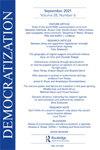塞尔维亚面临抗议:新的竞争性威权主义模式
IF 2.9
1区 社会学
Q1 POLITICAL SCIENCE
引用次数: 0
摘要
摘要最近的文献表明,与20世纪90年代的旧政权相比,21世纪出现的竞争性独裁政权更加微妙。为了更深入地理解这些差异,本文探讨了新的竞争独裁政权如何应对大规模抗议。这篇文章的重点是塞尔维亚的情况,在20世纪90年代的旧政权和现政权期间,该国的抗议活动都很普遍。通过分析过去十年中的五次抗议浪潮,我们能够确定该政权与抗议活动的三次主要战略互动,所有这些互动都与旧政权所采用的互动形成了鲜明对比。首先,与旧政权使用的抗议禁令和压迫机制相比,新政权倾向于允许抗议,并在战略上忽视抗议。其次,尽管过去警察暴力事件普遍存在,但如今抗议活动中显然没有警察。最后,这两个政权在描绘“其他人”的方式上有着明显的区别。虽然在20世纪90年代,国际敌人被明确识别并明确唤起,但新政权倾向于对抗议背后的不同但不具体的国际和地区敌人做出模糊和矛盾的说法。本文章由计算机程序翻译,如有差异,请以英文原文为准。
Facing protests in Serbia: patterns of new competitive authoritarianism
ABSTRACT Recent literature suggests that the competitive authoritarian regimes emerging in the twenty-first century are more subtle and nuanced in comparison to the old regimes of the 1990s. Aiming to understand these differences in greater depth, this article explores how new competitive authoritarian regimes react to mass protests. The article focuses on the case of Serbia, a country where protests have been widespread both during the old regime of the 1990s and the current regime. Analysing five protests waves in the past decade, we were able to identify three dominant strategic interactions of the regime with the protests, all of which contrast significantly with those employed by the old regime. First, in contrast to protest bans and oppression mechanisms used by the old regime, the new regime tends to allow, and strategically ignore protests. Second, while in the past police violence was widespread, there is an apparent police absence from the protests nowadays. Finally, there is a clear difference in the ways the two regimes portray the “Others”. While in the 1990s the international enemies were clearly identified and explicitly evoked, the new regime tends to make vague and contradictory claims about diverse but unspecific international and regional enemies behind protests.
求助全文
通过发布文献求助,成功后即可免费获取论文全文。
去求助
来源期刊

Democratization
POLITICAL SCIENCE-
CiteScore
6.40
自引率
12.50%
发文量
73
期刊介绍:
Democratization aims to promote a better understanding of democratization - defined as the way democratic norms, institutions and practices evolve and are disseminated both within and across national and cultural boundaries. While the focus is on democratization viewed as a process, the journal also builds on the enduring interest in democracy itself and its analysis. The emphasis is contemporary and the approach comparative, with the publication of scholarly contributions about those areas where democratization is currently attracting considerable attention world-wide.
 求助内容:
求助内容: 应助结果提醒方式:
应助结果提醒方式:


